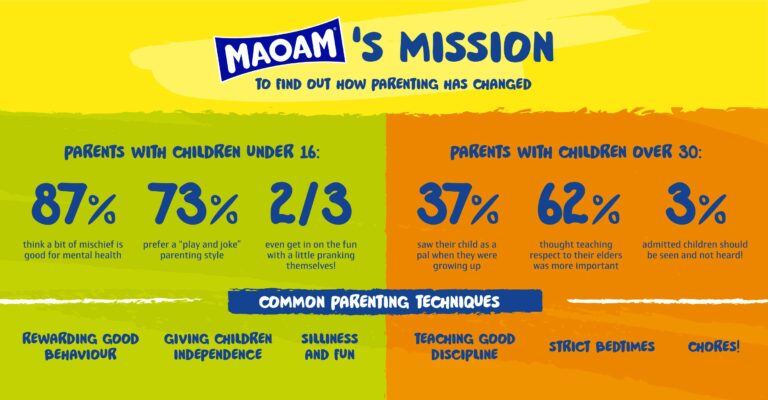
Modern parents want their kids to consider them as friends – with 73 per cent preferring to ‘play and joke’ rather than a stricter style of childcare.
A survey of 2,000 UK parents, 1,000 with youngsters under 16, and 1,000 with children over 30, revealed stark differences in bringing up their kids.
It found a resounding 87 per cent of today’s parents believe having a playful relationship with their child is good for their mental health.
And three quarters don’t expect their child to be on their best behaviour as they want them to have fun.
However, in the survey commissioned by sweet-maker MAOAM, to spread the message that mischief is healthy for families, only 37 per cent of older parents saw their child as a pal when they were growing up.
And the older generation said this playful style of supervision brings children up with a lack of respect (29 per cent) and the child won’t know boundaries when they grow up (45 per cent).
A quarter of mums and dads from decades ago even said treating children as friends is a ‘lazy’ style of parenting, while one fifth claims it shows a lack of assertiveness.
However, parenting expert Sue Atkins, working with MAOAM, disagrees. She said: “‘Being a playful, positive parent is important as they are making memories that last a lifetime.
“Kids have had a very tough time in the last year, so being a relaxed, confident, and connected parent helps children feel nurtured, supported and understood – which is good for their wellbeing and mental health.
“It helps parents form a strong bond which lays a solid foundation of a really loving parent-child relationship that lasts a lifetime.”
The study found parenting techniques typically deployed in the past include teaching respect to their elders (62 per cent), giving them chores around the house (49 per cent) and sending them to their room (41 per cent).
Years ago, children would also be encouraged to eat with everyone as a family (46 per cent), have a strict bedtime (40 per cent), and grounding would be the punishment for bad behaviour (35 per cent).
Three per cent even admitted a child should be ‘seen and not heard’.
In stark contrast, modern day parents are more likely to reward good behaviour (54 per cent), give them independence to learn from mistakes (48 per cent) and make time for silliness and playfulness (46 per cent).
While today’s mums and dads are happy to ignore mild disobedience (30 per cent), and let kids eat wherever and whenever they want (17 and 13 per cent respectively).
With almost two thirds admitting to playing harmless tricks and pranks on their offspring for fun.
The survey, commissioned by OnePoll, revealed in contrast, over half of the older parents polled expected their children to always be on best behaviour.
And 26 per cent said they would be disappointed if their son or daughter grew up to be mischievous.
Harriet Hogge said: “At MAOAM we’re all about mischief and encouraging parents to have fun with their kids.
“It’s so lovely to see the results of this survey reveal that parents are making time for silliness and playfulness at home and believe this is encouraging their kids’ positive mental health.”
Sue Atkins added: “It’s really great to see that parents are having fun and staying in the moment with their kids. Playful parenting is good for the whole family as it relieves tension, anxiety and stress and creates great memories.”
COMMON PARENTING TECHNIQUES TODAY
1. Rewarding good behaviour
2. Giving your child enough independence for them to learn from their mistakes
3. Making time for silliness and playfulness with your child
4. Making room for connection time
5. Helping them label and identify their feelings
6. Using bad behaviour as a learning opportunity
7. Ignoring mild disobedience
8. Allowing them to eat whenever they want
9. Not getting angry if they get home later than discussed
10. Allowing them to eat wherever they want
COMMON PARENTING TECHNIQUES 30 YEARS AGO
1. Teaching respect for elders
2. Stand by the rule ‘you don’t get everything you want’
3. Giving them chores to do around the house
4. Insisting everyone ate together
5. Good discipline
6. Sending them to their room
7. Setting a strict bedtime
8. Insisting on an apology
9. Grounding
10. Shouting when they step out of line
ENDS





















